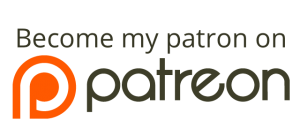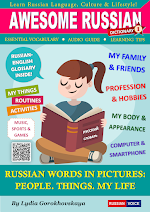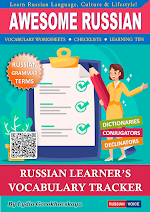Learning the alphabet is the first step to learning the Russian language. Learning how to read, write, and pronounce Russian letters is a must for beginners. At first, it may seem difficult to learn the Russian alphabet, but it is relatively easy. Some letters are the same as in the English alphabet, but others are different, so it’s important to take the time to learn Cyrillic.
Subscribe to my YouTube channel Russian Voice Online School to learn Russian vocabulary and grammar, listen to podcasts and stories in easy Russian.
The origin of the Russian alphabet
The name of the Russian alphabet is Азбука [AZ-booka]. The Russian Alphabet uses characters from the Cyrillic script Кириллица [ki-REE-litsa] which is named in honor of the Byzantine monk Saint Cyril. Together with his brother Methodius he created the first Slavic alphabet in order to translate the Bible and other Christian texts into the Slavic languages.
Originated from the ancient Greek script, Cyrillic script is used in several Slavic languages like Russian, Ukrainian, Belarusian, Serbian, and Bulgarian.It is also used by non-Slavic languages such as Kazakh, Mongolian, Tatar, Tajik, Kyrgyz, etc.
The Russian Alphabet consists of 33 letters:
10 vowels - А a, У y, О o, И и, ы, Э э, Я я, Ю ю, Е e, Ё ё
21 consonants - Б б, В в, Г г, Д д, Ж ж, З з, Й й, К к, Л л, М м, Н н, П п, Р p, С c, Т т, Ф ф, Х x, Ц ц, Ч ч, Ш ш, Щ щ
2 signs - Ъ, Ь
What letters seem familiar to you?
How to read Russian letters
Spelling and pronunciation are very close in Russian. Every Russian letter has basically only one pronunciation. If you know the sounds of letters, you will be able to read Russian words simply letter-by-letter. To make your journey to the world of the Russian language easier, let’s divide all letters into five groups. For your convenience, I colored vowels in red and consonants in blue.
1. Twins. These letters look and sound almost the same as in English alphabet.
А а = [ah] as in cut but longer
О о = [oh] as in pot but longer
К к = [k] as in kitten
М м = [m] as in mom
Т т = [t] as in Tom
С с = [s] as in century
2. False Friends. These letters look the same as in English alphabet but sound different.
У у = [oo] as in moon
И и = [ee] as in meet
Е е = [ye] as in yes
P p = [r] as in rock but harder
B в = [v] as in voice
H н = [n] as in not
Х х = [kh] as in hot
3. Strangers. These letters look unfamiliar but have familiar sounds.
Э э = [е] as in set
ы = [open i] similar to [i] in bit but we pronounce it wider. ы doesn't have a capital letter.
Б б = [b] as in baby
Г г = [g] as in got
Д д = [d] as in dog
З з = [z] as in zoo
Л л = [l] as in love
П п = [p] as in paper
Ф ф = [f] as in foto
4. Letter Й and Strangers.
Й й = [y] as in yes, boy
Ё ё = [yoh] as in your
Ю ю = [yoо] as in you
Я я = [yah] as in Yahoo
5. Sounds of Nature and Signs. The first group consists of letters that look or sound like insects. They are Ц, Ж, Щ, Ч. The second group includes the letters Ь, Ъ.
Ж ж = [zh] as in Jeanette
Ч ч = [eh] as in chicken
Ш ш = [sh] as in shell
Щ щ = [sh’] similar to [sh] in she but softer
Ц ц = [ts] as in cats
Ъ = твёрдый знак [tv’ordiy znak] hard sign doesn’t have any sound
Ь = мягкий знак [m’ahkiy znak] soft sign - super short i pronounced as Russian И but shorter
How to Get Started with Russian Learning
Do you want to learn Russian letters and get to know how to read and write in Russian? I recommend you to start with my course Awesome Russian Basics. With its help, you will master the Russian alphabet and print handwriting, learn your first Russian words and phrases, improve your Russian listening skills, and get to know how to write simple stories in Russian.
The course includes:
- Interactive PDF textbook with handwriting practice;
- Audio guide (links and QR-codes);
- List of the Russian alphabet with the right pronunciation;
- Big and clear examples that show you how to trace block letters by following arrows;
- Introduction to Russian phonetics;
- Pronunciation and spelling rules;
- Russian phonetic exercises;
- Words and phrases with stress marks and English translation;
- 300+ basic Russian words and phrases on various topics: people, things, jobs, food, days of the week, months, colors, countries and cities, numbers, personal and possessive pronouns, questions, daily activities;
- 7 stories in easy Russian: It’s Moscow!; My Family; My Bag; My Apartment; My Room; My City; My Smartphone;
- 16 Russian motivational quotes about studying and learning.
























0 Comments